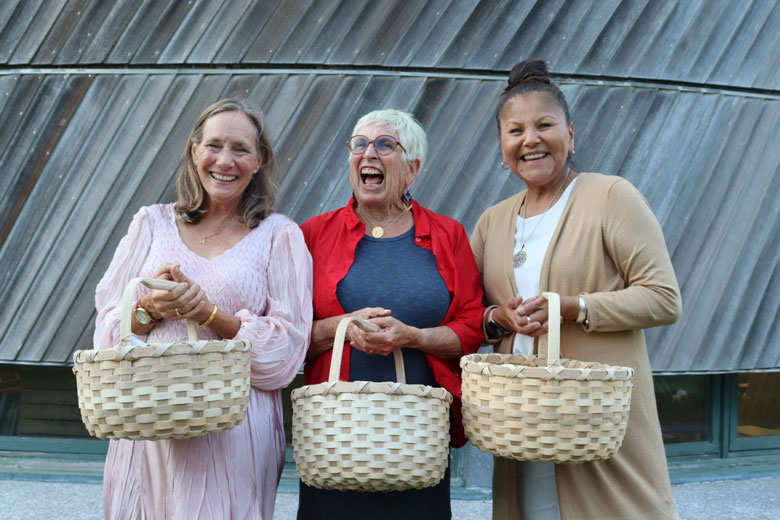By EMMA DAVIS/MAINE MORNING STAR
MaineMorningStar.com
The Wabanaki Nations embody what Carol Wishcamper characterized as patient persistence.
Wishcamper, a founding supporter of the Wabanaki Alliance, was one of three people honored July 11 at the Abbe Museum in Bar Harbor at Nihkaniyane, the second year that members of the alliance and allies have come together to recognize the coalition’s work and the relationships that make it possible.
Each of the honorees spoke to this ability—being able to hold a vision, despite setbacks and slow progress, toward the overarching goal of having the state of Maine recognize the sovereignty of the Wabanaki Nations.
The Houlton Band of Maliseet Indians, Mi’kmaq Nation, Passamaquoddy Tribe, and Penobscot Nation—collectively known as the Wabanaki Nations—joined together in 2020 to push for changes to the 1980 Maine Indian Claims Settlement Act, which has set the Wabanaki Nations apart from the other 570 federally-recognized tribes in the U.S. in being treated more like municipalities than independent nations.
In the four years since the founding of the Wabanaki Alliance, a coalition that has grown to more than 250 organizations across Maine, progress has been made, said Maulian Bryant, Penobscot Nation tribal ambassador and president of the Wabanaki Alliance, though trust between the tribes and state remains tenuous.
The commission found that Wabanaki children entered foster care at disproportionate rates.
While Gov. Janet Mills, a Democrat, has opposed sweeping reform of the Settlement Act, she’s ushered through piecemeal changes pushed for by the tribes, lawmakers, and constitutional officers—several of whom were in attendance in Bar Harbor, including House Speaker Rachel Talbot Ross (D-Portland) and Attorney General Aaron Frey.
“The Wabanaki people know, probably better than most, that change takes time,” Bryant said. “It takes a relentless pursuit of equity and justice. It takes convincing folks that it is needed one heart and mind at a time. The way to get this done is with drive, dedication, and a tireless passion for sharing humanity.”
In addition to Wishcamper, the alliance on Thursday also honored the contributions of Rena Newell, former Passamaquoddy Tribal representative to the legislature and former chief of the reservation at Sipayik, and Beth Ahearn, who this year retired as director of government affairs for Maine Conservation Voters, a nonprofit focused on protecting the environment and one of the earliest members of the Wabanaki Alliance.
Newell, who currently serves as interim associate director of the Wabanaki Alliance, said the relationships people have with one another allow for collective learning and movement forward.
During her time in the State House, Newell led efforts to expand tribal-state coordination, including paving the way for greater sovereignty for the Passamaquoddy two years ago. Newell sponsored legislation that provided tribal members at Sipayik, also known as Pleasant Point, more power to regulate local drinking water by, among other means, removing barriers in the Settlement Act that had prevented the tribe from fully accessing federal funds and remediation resources that were available to other federally recognized tribes.
“I have been blown away by the determination and perseverance that you have shown and modeled on striving toward tribal sovereignty,” Ahearn said at the event. “I know you’re going to get there because that’s what you have, incredible determination and heart.”
Wishcamper, who served as co-chair of the Maine Wabanaki-State Child Welfare Truth and Reconciliation Commission which investigated the state’s compliance with the Indian Child Welfare Act and removal of Wabanaki children from their communities, said one of the gifts of her life has been having relationships with Wabanaki people and being able to learn from each other.
The commission found that Wabanaki children entered foster care at disproportionate rates, often failed to be identified as eligible for Indian Child Welfare help at intake, and were less likely to be adopted than children overall—findings that the commission concluded can be viewed as evidence of cultural genocide.
The commission issued its report in 2015, mere weeks before the Wabanaki delegation walked out of the State House over growing disagreement between the tribes and state over sovereignty.
“The tide was beginning to change,” Wishcamper said. “That was a watershed moment.”
Still, Wishcamper said, the first recommendation in the report—to respect tribal sovereignty—has not yet been implemented by the state. Wishcamper said she plans to keep showing up, as the Wabanaki have demonstrated for her, to “hold the vision, know that it’s right and true.”
While the third attempt at sweeping sovereignty legislation languished this year, the most substantive change to the Settlement Act did become law: extending tribal authority to prosecute more serious offenses committed on tribal territory by tribal members.
Last year, Congress amended one of the federal protections the Wabanaki Nations had been excluded from under the Settlement Act, the Violence Against Women Act, providing the Wabanaki Nations expanded jurisdiction.
Bryant said that provides a solid foundation for the tribes to again take on more responsibilities and expand court capacity under the new state law.
The larger Penobscot Nation and Passamaquoddy Tribe have full court systems, whereas the Houlton Band of Maliseet Indians opened the doors of a Healing to Wellness Court earlier this year, which is focused on offering alternatives to jail for those that have substance use issues.
The law expanding criminal jurisdiction also extended the period for the Penobscot Nation to certify a law the legislature passed last year allowing the tribe a greater role in the management of its drinking water, which the tribe did unanimously in June, Bryant said.
But the session also saw the alliance’s priority bills fail, including a proposal to create an office of tribal-state affairs and to pilot a Wabanaki-focused curriculum for public schools.
Last fall, voters also overwhelmingly supported a measure to put the state’s obligations to the Wabanaki Nations back into print in the state Constitution, after the requirements had been redacted in 1876 despite still being in effect.
Newell recounted advice she offered someone starting work in the Wabanaki Alliance: “Just be open. Together, if we come to the table in an open, respectful manner, I think we can go far.”





